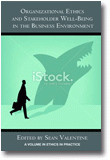
Organizational Ethics and Stakeholder Well-Being in the Business Environment
Edited by:
Sean Valentine, University ofNorth Dakota
A volume in the series: Ethics in Practice. Editor(s): Robert A. Giacalone, Texas State University. Carole L. Jurkiewicz, University of Colorado, Colorado Springs.
Published 2014
Organizational ethics involves the institutionalized principles, guidelines, and norms that influence how a company and its employees function in an ethical manner. Ultimately, these processes collectively influence a firm's 1) overall sense ofbusiness ethics, 2) management of employees, and 3) interactions with partners outside of the immediate work environment. Researcher and practitioners are interested in organizational ethics because the different approaches used to develop such a context generate many other positive business outcomes.
While the connection between organizational ethics and employee/stakeholder well-being has been explored, moving forward with a number of new investigations should push the literature forward. This book seeks to explore these important topics and present a more comprehensive overview of organizational ethics and stakeholder well-being in the business environment. Such inquiry is important because the linkages between business ethics and stakeholders, if wellmanaged, have the capacity to benefit both companies and employees. In addition, the content of this book should serve to guide future investigations within this area of business ethics.
CONTENTS
Foreword, Robert A. Giacalone and Carole Jurkiewicz. Organizational Ethics and Stakeholder Well-Being in the Business Environment: A Primer for Moving Forward, Sean Valentine. PART I: ORGANIZATIONAL ETHICS AND THE WELLBEING OF WORKERS. Ethics Institutionalization and Its Impact on Quality of Work Life and Employee Job-Related Outcomes: A Review With Managerial and Research Implications, Anusorn Singhapakdi, M. Joseph Sirgy, and Dong-Jin Lee. The Relationship Between Business Ethics and Job-Related Well-Being, Ronald R. Sims and William I. Sauser, Jr. PART II: LEADERSHIP, MANAGEMENT, AND ORGANIZATIONAL ETHICS. Employee-Centered Ethical Leadership, O.C. Ferrell, Linda Ferrell, and Jennifer Sawayda. Damage Control After Breaches of Ethical Conduct: An Attributional Approach to Accounting for Unethical Behavior, Jeremy Brees, Jeremy Mackey, Mark Martinko, and Paul Harvey. Factors Impacting Employee Performance in a Chinese State-Owned Company, Weihui Fu and Satish P. Deshpande. Ethical Decision-Making in the Operations Function of Organizations: Managerial Challenges and Opportunities, David Hollingworth. PART III: CORPORATE SOCIAL RESPONSIBILITY AND WELL-BEING. Employee Well-Being and Engagement in Corporate Social Responsibility, Lynn Godkin. CSR Costs Versus Benefits for Firms in the Extractive Energy Industry: A Commentary, Gary Fleischman. PART IV: SMALL BUSINESS ETHICS AND EMPLOYEES. A Social Exchange Perspective on the Ethical Context in Family Firms, Tim Barnett and Rebecca Long. Ethics and the Family Firm: A Climate for Healthy Families and Healthy Employees, Roland E. Kidwell, John J. Cater III, and Linda A. Kidwell. PART V: MARKETING ETHICS AND WELLBEING. Millennials as New Salespeople: Moral Reasoning and Implications for Employee Well-Being, Scott K. Radford, David M. Hunt, and Terri L. Rittenburg. Institutionalizing Well-Being Marketing Into Employer Brand Management: A Normative Framework Impacting Employee Engagement and Outcomes, Connie Bateman. About the Authors.
-
Paperback9781623966348
Web price: $45.04 (Reg. 52.99)
-
Hardcover9781623966355
Web price: $80.74 (Reg. 94.99)
- eBook9781623966362

- BUS041000 - BUSINESS & ECONOMICS: Management
- BUS008000 - BUSINESS & ECONOMICS: Business Ethics
- BUS071000 - BUSINESS & ECONOMICS: Leadership
-
 Diversity as Strategic Opportunity
Exploring New Paths to Good Administration
Diversity as Strategic Opportunity
Exploring New Paths to Good Administration
-
 Educating in Ethics Across the Professions
A Compendium of Research, Theory, Practice, and an Agenda for the Future
Educating in Ethics Across the Professions
A Compendium of Research, Theory, Practice, and an Agenda for the Future
-
 Ethics and Crisis Management
Ethics and Crisis Management
-
 Ethics and Risk Management
Ethics and Risk Management
-
 Ethics Training in Action
An Examination of Issues, Techniques, and Development
Ethics Training in Action
An Examination of Issues, Techniques, and Development
-
 How to Transform Workplace Bullies into Allies
How to Transform Workplace Bullies into Allies
-
 Radical Thoughts on Ethical Leadership
Radical Thoughts on Ethical Leadership

